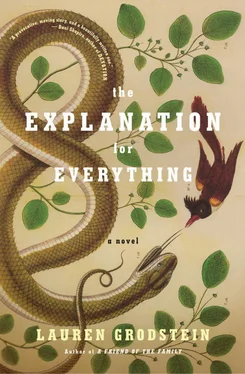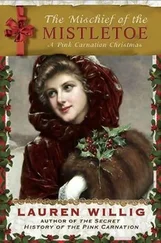“Give me a break, Melissa. And call me Andy.”
She shook her head, smiling to herself, stirring macaroni. “I can’t. I was raised to respect the student-teacher relationship.”
What surprised him too was how Melissa seemed to have grown into herself over these past few weeks—or how she seemed to grow more at ease in front of other people. She no longer walked into his office half hunched over, holding a notebook to herself like armor. Instead, she stood straight, looked directly into his eyes. She was prone to the occasional touch of a shoulder, which gave Andy, he couldn’t help it, a tiny shiver. A young woman touching him! He was such a sucker. Invisible Lou, standing in the corner, would roll her invisible eyes.
Melissa was still awkwardly built, of course, tall, thick, and broad—had she been born a boy she might have been a linebacker—but, in the way of certain homely girls, she had a smile that lit up her entire face. She still wore her gold cross sometimes but she no longer sucked on it.
“You know you don’t even have to pay me,” she said, sticking his money in her back pocket one Friday afternoon. “I’d do this for free. Your girls are great.”
“Don’t be ridiculous,” he said. “You earned it.”
“But just so you know, I mean it, I’d come for free.” Then she grinned at him, flounced her hips a little as she walked out the door. Or did he imagine that? When he woke up at four in the morning, why did he calm his frantic heart with the memory of her smile?
ALTHOUGH ANDY USUALLY only required Melissa’s services during the afternoons or early evenings, when teaching or meetings kept him on campus late, toward the end of the semester he reserved her (insisting he would pay her, pay her overtime, even) for the second Saturday night in December. It was Marty Reuben’s annual biology department holiday party, which Andy anticipated and loathed in equal measure. “I know you have finals,” he said. “It’s fine if you don’t want—”
“No, no,” she said. She was in his office, pointing out a particular passage in Dawkins which gave her offense. “I’d love to. I had nothing else Saturday night anyway.”
Marty Reuben lived about an hour from Andy in Lace Point, a Philly suburb Marty despised for its muted anti-Semitism, but which he found himself unable to quit because the schools were so good and the village was so picturesque. So Marty stayed and feuded with his neighbors, stealing the signs supporting Republican candidates off their lawns. His wife, Jane, cooked beautiful dinners and shook her head at her husband’s eccentricity.
“It’s just inertia,” Marty would say, when pressed (not that anybody pressed him, really) to defend his decade-long residence in Lace Point. “It’s hard, isn’t it? You got the house, you got the kid in school, you got your bank and your barber, you know. And selling a house is a pain in the ass. In this market? You gotta be crazy, really. So Lace Point it is, at least while the kid’s at home.” Here, the dissolute sigh. “And me, I always thought I was gonna live in Shanghai.”
And oh, how Andy resented the way he enjoyed nights in Marty’s fine house, eating his fine food, listening to funny tales of his fine travels (boating the canals of eastern France, climbing Guatemalan ruins). Why did Marty Reuben live in a beautiful house in a beautiful village with a gourmet wife and a lively daughter, why was his biggest problem the ongoing feud with his neighbors about Mitt Romney? Why was his life so privileged that he thought American politics were his biggest problem? And Nina Graff who brought her ridiculous vegan casserole even though the party was not a potluck, it was never a potluck, and Linda Schoenmeyer, the chair, who seemed to be getting fatter every year, with her doggedly devoted husband, and George Hayad with his silent wife who seemed doggedly devoted too, in her enormous bangles—why were all these people so blissful? All of them, two by two, eating hors d’oeuvres in Marty’s living room, admiring Jane’s kitschy antiques, sitting next to one another at the table, living their gloriously becoupled lives. Meanwhile, who did he have for a companion? Most years, nobody. This year, because he could not stand one more year of sitting solo at the end of the table, he’d asked Sheila.
“Really?” They’d stood in front of her house the previous afternoon—Andy had just dropped off the girls at their dance lessons, and Sheila had been pulling into her driveway, looking miserable, since she had just dropped Jeremy off with his dad, and would spend the weekend alone. Andy knew how lonely she was, and felt that he should do something nice for her. He hadn’t been particularly nice to her, he knew that.
Still, he hedged. “I’m not promising it will be fun.”
“A dinner party in Lace Point sounds like fun,” Sheila said.
“But it’s full of biologists.”
“So? I like biology,” she said. “What little I know about it.” He tried not to notice how pleased she seemed, how she smiled like a prize winner. He tried to force the memory of her wide pale body from his mind. “What should I wear?” she asked.
“Nothing special,” he thought, but then worried that Sheila would take him seriously, dress in one of her pocketed sweatshirts. “Business casual.”
“So I’ll wear my scrubs?”
“Right,” Andy said, trying out a chuckle. “Scrubs.”
“Okay,” she said. “I’m looking forward to it.”
Instead of wearing scrubs or a sweatshirt (or overdressing, which would have been worse) Sheila wore a navy blue dress, simple, the sort of thing you could wear comfortably to a funeral or a job interview or a faculty dinner. She had put in her contacts, let her bangs fall to the side of her face instead of straitjacketing them in that horrible barrette, and when Andy told her she looked very nice, he meant it.
“I got some wine,” she said.
“You didn’t have to,” he said, although he was glad she did, because he’d forgotten to bring some, and it was the usual thing to bring wine to Marty’s boozy dinners, but then he felt shame that the alcoholic had to remember the wine, that the alcoholic felt so obligated by this social occasion that she would walk into a liquor store to satisfy the obligations. “You really didn’t have to.”
“I thought it would be a good thing to do. I was actually going to bring flowers but the only thing they had at ShopRite were poinsettias, which are so Christmassy, I don’t know.”
“No, wine is nice. Is it hard for you to go into liquor stores?”
“Oh man, you have no idea, I just go crazy! I just rip corks out with my teeth and smash bottles in the aisles!” She laughed, she was being sarcastic. “You can say it’s from you,” she said, sliding into his car, giving Andy pause. Did she bring it because she knew he’d forget? Did she really know him that well?
The ride to Marty’s was pleasant—they talked about their kids, Rachel’s latest culinary inquisitions, Jeremy’s karate. Sheila said she liked to go to the Lace Point crafts fair every November, and that she’d sometimes take a walk around the various neighborhoods, peering into the oversized Tudors and colonials. “Once I broke in.”
“You what?”
“Well, it wasn’t exactly criminal.” She smiled, looked out the car window into the endless, impenetrable pines. “The house had a FOR SALE sign, so I thought I might just try the door. It was this mansion, Andy, the sort of thing I used to think I’d live in when I was a little girl. I couldn’t help it, I just had to see—and so I did, and it was open, and the house was, I don’t know. It was empty, the owners had clearly already left, but even so the place felt like Cinderella’s castle or something. There was a pond in the backyard with swans.”
Читать дальше












